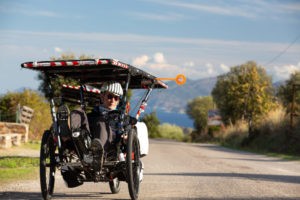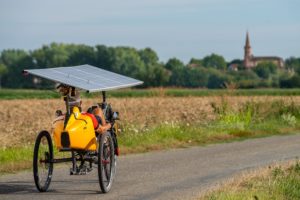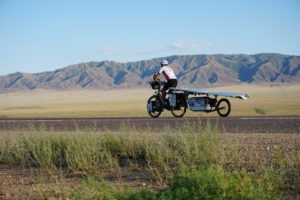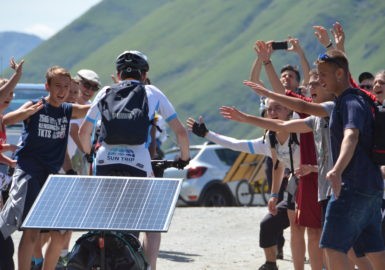Since bicycles were invented, countless adventurers have gone out and seen the world carried forward by the power of their muscles. Cycling often means freedom and a slow cruise, roaming overland and discovering the world and its inhabitants. Wheeling around, one gains both cardio and muscle without consuming fuel or polluting: it is a simple means of transportation, but most of all, it’s an active one.
From a Mechanical to an Electrical Innovation
Electrically assisted bicycles – e-bikes or pedelec – brought a revolution to a universe where technological progress was beginning to stall. By adding an engine to a wheel or near the crankset (mid-drive), people that were once foreign to the world of bicycles have started to show interest in it. Suddenly, a 15 km commute became less scary. Sedentary, elderly or disabled people could much more easily integrate cycling into their lives than before. Nowadays, 40% of new bikes sold in France are e-bikes, two thirds of which are intended for urban use. But this electrical revolution does not only change the way we ride in cities. Electrification is gradually being extended to recreational bikes: mountain bikes, road bikes and touring bikes.
But even exciting innovations bring their legitimate share of concerns. High manufacturing costs remain an obstacle to many. The significant weight of the electrical system diminishes its overall efficiency, but lighter equipment could prove fragile and hardly sustain shocks and vibrations over time. What about the issues pertaining to lithium batteries? They are not well recycled and lithium is a non-renewable resource. Road safety concerns quickly prompted authorities to create clear categories to limit and control e-bikes speed and power in order to distinguish them from other motorized vehicles. And even if not fuelled by fossil energy, a question remains : How will this energy be produced?
The Sun Providing Fuel…
On this last question, solar bicycles provide possible answers. What if we could incorporate renewable energy production into a bike’s design? The mileage range could become endless. After accounting for the panels’ manufacturing and disposal, we’d be assured that the bike rides on a low-emission energy. Perhaps it would then be necessary to think over the bike design, to optimize weight, structure stability, solar exposure, panels performance and durability, mechanical reliability … A bunch of creative challenges for the inventor, the tinkerer!
How to Transform Your Bicycle into a Solar One: A Tutorial – excerpt from a GEO Aventures report covering the Sun Trip 2018. Dans les rayons du soleil was published in the GEO Aventure magazine #5 (January-March 2019).
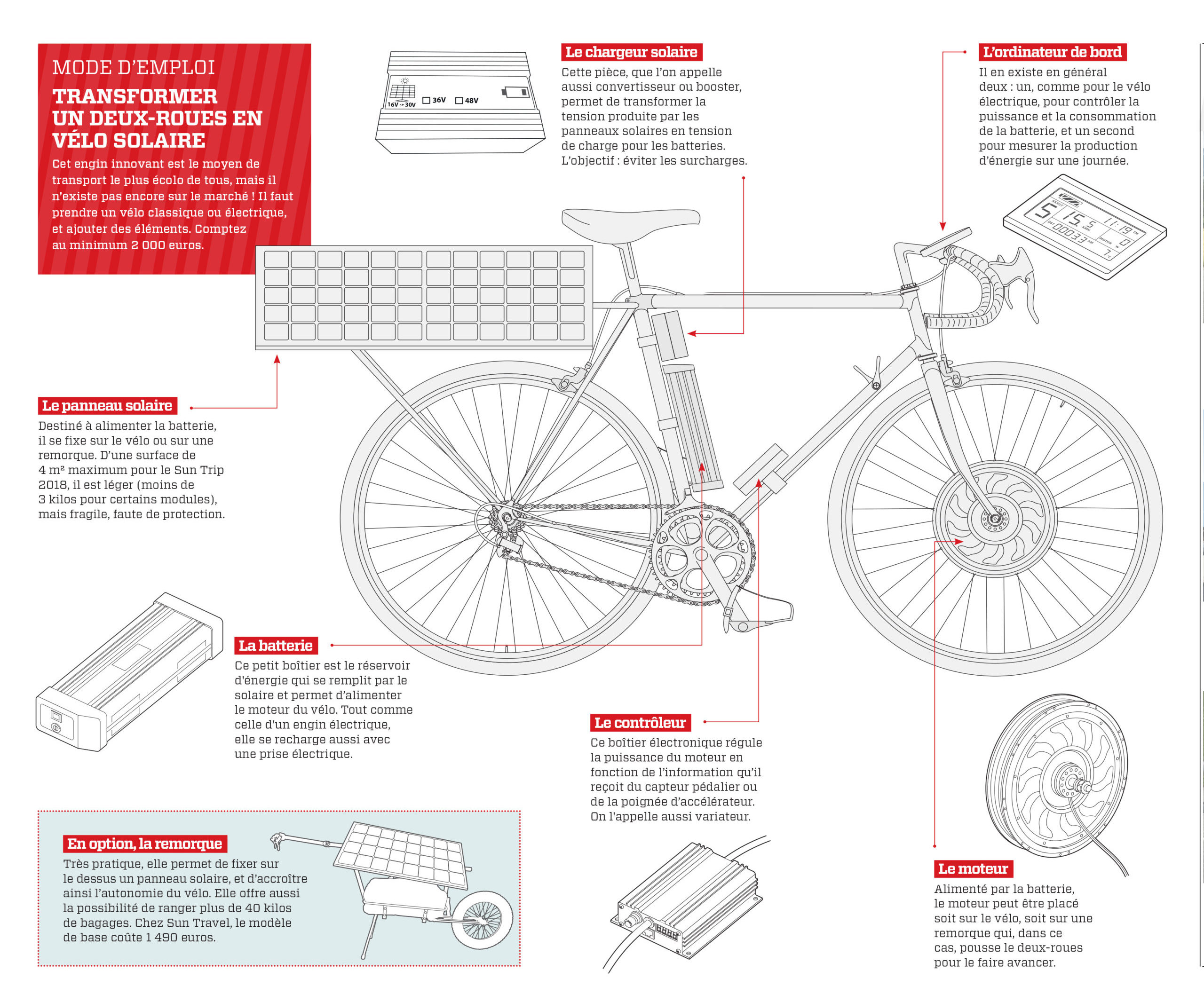
… Until the Rising Sun!
When it comes to testing their robustness, their reliability, and their efficiency, there’s a good way to test these new human and solar-powered machines: design a wide array and see how they manage on worldwide roads. Which one will be faster? Which will resist the harshest conditions? Which one will surprise us most?
The Sun Trip rally gathers a happy bunch of sportspeople, hackers, and backpackers to pit their strength and put their machines to the test. Like one the great sailing or orienteering adventures, they are free to choose their own itinerary. But here, participants travel mostly on roads through a living environment: countryside, villages and cities. Bicycling touring is conducive to human encounters. Electro-solar machines are no exception, and they carry their solar panels as ambassadors of renewable energies and alternative mobility.
To each their own! The solar prototypes will have to complement the strengths and weaknesses of their riders, but also to be designed according to the challenges ahead. Adventurers will have to manage their trip on their own or be given help by the people they meet along the way, without a following vehicle or any other on-site assistance. If the bike breaks down in the middle of the desert, they will have to find solutions to repair or repatriate it. What if they have to weld a custom aluminium bike fork in the middle of Kazakhstan? How not to lose their mind when they get their 45th puncture on the Chinese roadside? Endurance athletes might get a head start, but will they build a machine that meets their expectations? Will they be able to find help in the event of a major issue? Immense freedom also means immense responsibilities.
In this humanist and joyful epic, everyone can try their luck: young or old, experienced backpackers or budding travellers, sportspeople or longtime dreamers, able-bodied or people with disabilities. The strong and diverse personalities of our participants are the basis of the Sun Trip’s success with its audience.
Challenges for all audiences
To meet everybody’s expectations of a good show, the Sun Trip includes a variety of optional challenges since the very first event.
The “Solar Challenge” is certainly the most talked about on the international Sun Trips. It rewards the fastest adventurers that solely rely on solar energy to recharge their batteries. Over the years, the winners of this challenge came to a daily average of 300 km! Raf Van Hulle (2013 and 2018) and Bernard Cauquil (2015) are for the moment the only two champions of this challenge.
Another challenge that is written into our history is related to our adventurers’ communication skills. The “Best Blogger” challenge (as we once called it) allows our audience to vote for the best team when it comes to sharing their adventure. In 2013, Stéphane Scotto di Cesare and Stéphane Briel first won it. In 2015, Team Go4Ecomobility earned the first position. More recently, our dean Françoise Denel was deemed a communication star by our followers.
Communication skills are also taken into account with a Jury’s Choice, a challenge first won by the Quebecoise Anick-Marie Bouchard in 2013, before becoming a reward for adventurers who demonstrate communication versatility while completing the course. Béatrice Cazanave and Yannick Aspe earned this prize in 2015, followed by Jack Butler, the young Englishman, in 2018.
Finally, the “Coup de Coeur Award” was created in 2015 (Thomas Pollet) and kept in 2018 (Youssef El Haouass & Mohamed Said Jbari) to salute performance as much as a certain state of mind in line with our values.
International & Regional Events
If making it to distant lands is what made most people discover the Sun Trip at first, the event has been replicated at a regional scale in France since 2017.
The Sun Trip Tour around the Auvergne-Rhône-Alpes region was launched in the summer of 2017: a 15-day tour concept, with some assistance. This successful experience was renewed in 2019. This more local concept makes it possible for a wider audience to connect and experiment with the great Sun Trip dream. Other regional events include the Corsica Sun Trip (2019) and the Pirineos Sun Trip (initially planned for April 2020 and now postponed), week-long events including hospitality and prioritizing conviviality.
A story still to be written.
